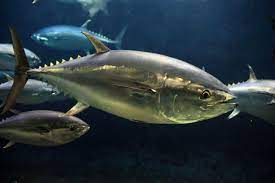In Tuvalu, Kiribati, the Marshall Islands, and other small Pacific island nations, the tuna fishing industry is a linchpin of the economy.
“It is very significant … mainly in revenue for the countries,” says Sangaalofa Clark, CEO of the Parties to the Nauru Agreement Office.
The organisation was created by an agreement among small Pacific islands to collaboratively manage the region’s tuna fishery.
Fishing vessel owners from around the world pay access fees to fish in these nations’ waters. And in several of the countries, that money provides more than 40 percent of government revenue each year.
But as oceans warm, tuna populations are expected to shift east and north into waters beyond these nations’ jurisdiction.
Clark was part of a team that estimated the potential losses in fishing fees revenue for 10 small island economies if carbon pollution keeps increasing through 2050.
“The changes are projected to cause a loss in government revenue … of around US$90 million a year,” Clark said.
So although these countries generate only a tiny amount of carbon pollution, they will pay a steep price for the warming caused by others.
SOURCE: YALE CLIMATE CHANGE CONNECTION/PACNEWS















